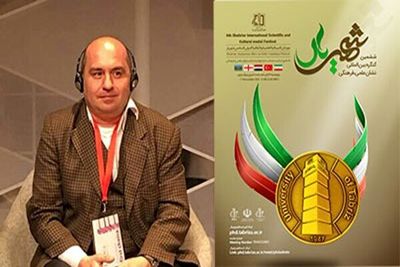He received the award for his paper on the Iranian studies in Georgia offered online during the Sixth Shahriar International Scientific and Cultural Medals Festival, which was organized by the University of Tabriz last Wednesday.
Over ten scholars from, Turkey, Azerbaijan, Iran, Georgia, Iraq and several other countries delivered speeches during the festival.
The Iranian Culture Center in the Georgian capital of Tbilisi handed over the medal to Lobzhanidze, Iran’s Islamic Culture and Relations Organization.
Lobzhanidze, an oriental studies and Arabian language graduate of Tbilisi State University, is the director of the Oriental Studies Department at the Center of Cultural Relations of Georgia.
In 1997, he came to Iran to work on his Ph.D. research project in religion and mysticism at the University of Tehran. After returning to Georgia in 1999, he again started working at Tbilisi State University.
In 2005, he wrote his doctoral thesis on the topic “Jesus and Virgin Marry in the Quran”. He is currently known as a distinguished translator of a new generation.
He is a translator of the Quran, and the collection “Persian Fairy Tales” and the Gulistan by Persian poet Sadi, “The Water’s Footsteps” by Sohrab Sepehri and “Another Birth” by Forugh Farokhzad.
Lobzhanidze has also composed five poetry collections: “A Teacher of Arabic”, “Noontime Shadows”, “A Bouquet of Dandelions”, “Boiling Temperature” and “Orphan’s Kaveri”.
His translation of two volumes of Persian poet and mystic Molana Jalal ad-Din Rumi’s Masnavi-ye Manavi was introduced at Ivane Javakhishvili Tbilisi State University in the Georgian capital of Tbilisi in May.
Lobzhanidze talked about the technical complexities of the translation of the book and the mysteries surrounding the numerous concepts the collection carries.
He also said that Rumi used the Holy Quran, hadiths from the Prophet Muhammad (S) and allegories to express his mystic thoughts and Islamic teachings, and praised Rumi’s knowledge of the three sources of his inspiration.
He also noted that Rumi’s thoughts have been expressed by many people from cultural communities across the world as his thoughts are universal.
Source:Tehran Times

